Newsletter
Issue 5 Winter 2006

|
Newsletter |
 |
|
1,000 PATIENT
PAPER SUBMITTED
|
|
|
Regional
focus - COLOMBIA
Jorge Mejia Mantilla, Colombia National Co-ordinator |
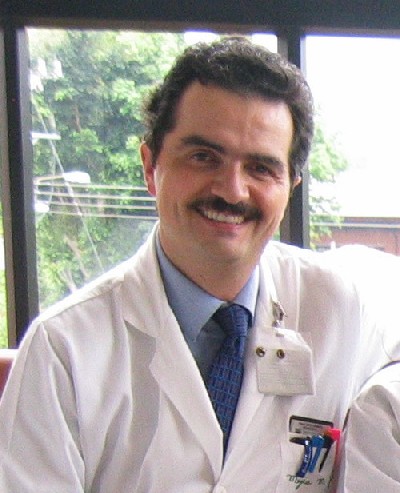 |
|
As in many other regions in the world, trauma is a major cause of death and disability in Colombia. Although the government recognises the problem it has not been a priority to research agencies. The economic impact of trauma on patient care is so high that some hospitals are overwhelmed and can hardly find resources to keep working. The emergency system in most Colombian cities is loosely organised. The care of trauma patients is centred on public hospitals where most patients are treated by top level university personnel with high commitment and formation, but they have scarce resources to assure the care of severely injured patients. Finding cheap and efficacious tools to treat those patients should be a major goal of our research efforts. Nevertheless, physicians and nurses working in those university hospitals have demonstrated their interest and capacity for research. The research in trauma is difficult to carry out; not just the problem of funding it but the design of a trial can be subject to disagreement. The CRASH trials are a great example of the research we need: with a very clear and simple design they have approached controversial issues. Colombia participated in the first CRASH trial with an important number of centres and contributed with a large number of patients. Now, the second mega-trial in trauma conducted by the CRASH trial group is on the way to answer a very important question in trauma care. Clinicians embraced this trial with a great interest and keenness, but having the approval of ethics committees and regulatory agencies has been a hard task, partly because there is a low research activity in the country and by consequence a misunderstanding about what research means; partly because the CRASH trials are different to most other trials designed to evaluate new medications in more controlled settings. The uncertainty principle is a relatively new tool in research and some research committees in Colombia are not aware about its meaning and usefulness. I would like to highlight the work of various collaborators like Carlos Morales, Juan Diego Ciro, Carolina Gómez, María Isabel Calle and Hernán Delgado for their enthusiasm and celerity in starting the trial in their centres and for keeping the pace on recruitment and reports to the London centre. |
|
|
Alexander Sanclemente of Hospital Universitario San Vicente de Paul in Colombia randomised the 1,000th patient into the trial and the hospital has received the well deserved £200 prize. |
|
|
INTRODUCING
THE INTRANET FOR COLLABORATORS
|
|
|
We are very happy to announce that your Intranet is now fully functional and take this opportunity to invite you all to visit the site. The Intranet is accessed from the CRASH2 homepage by clicking on the button INTRANET FOR COLLABORATORS. You will need a username and password which you can get from us by email. Besides adding new features, such as materials ordering facility, we shall keep your Intranet updated with trial information of particular interest to collaborators and welcome your suggestions as to what you would find useful. At present we have various guidance notes, PowerPoint presentations, patient leaflets in over 30 languages and the latest versions of the electronic entry and outcome forms, all of which may be downloaded. Completed data forms may also be uploaded direct to the server which is the most secure method of sending data to us. We were delighted to receive our first uploaded forms sent in by Fukuoka Hospital in Japan and Care Hospital in India. Of special interest to many of you will be the Good Clinical Practice training package. If you do not already possess a certificate in GCP training then do complete the on-line quiz at the end of the training package. Certificates will be issued to those who pass with 75% and above. Please
visit the site and we look forward to hearing your suggestions and comments.
|
|
 |
|
|
|
||
| ALL
THESE CENTRES RANDOMISED THEIR FIRST PATIENT WITHIN 10 DAYS OF RECEIVING
THEIR TRIAL MATERIALS: Patrick Druwé, Sint-Vincentius Hospital, Belgium Ji-yao Jiang, Renji Hospital, China Jorge Mejia Mantilla, Fundacion Clinica Valle del Lili, Colombia Juan Ciro, Clinica las Americas, Colombia Marcelo Ochoa Parra, Hospital Jose Carrasco Arteaga, Ecuador Mario Izurieta, Hospital Luis Vernaza, Ecuador Hussein Khamis, Mataria Teaching Hospital, Egypt Tamar Gogichaisvili, Tbilisi State Medical University, Georgia R R Ravi, Medical Trust Hospital Kochi, India Wu Hoong Chhang, North Bengal Neuro Research Centre, India Venkatesh Babu and C Sumathi, Sri Sakthi Hospital, India Nyoman Golden, Sanglah General Hospital, Indonesia M Modiba, Dr George Mukhari Hospital, South Africa Surakrant Yutthakasemsunt, Khon Kaen Regional Hospital, Thailand |
||
|
|
We welcome Dawn Davis to the CRASH team as assistant trials administrator. She has worked within university administration for a number of years and has a keen interest in health related issues, particularly within the area of research. Dawn’s role is to support the trial administration dealing with materials, drug stocks, ethics approval processes etc. She says: “I am new to the area of clinical trials and I envisage that over the coming few months my experience on the CRASH2 trial will be both challenging and rewarding.” |
|
|
New systematic review: Is rehabilitation after brain injury useful? There
is evidence that multi-disciplinary rehabilitation is effective in the
stroke population where older adults predominate. However, the evidence
base for the effectiveness of rehabilitation following acquired brain
injury (ABI) in younger adults is not established. A Cochrane review1
attempted to assess the effects of multi-disciplinary rehabilitation following
ABI in adults, 16 to 65 years. The authors conclude that patients presenting
acutely to hospital with moderate to severe ABI should be routinely followed
up to assess their need for rehabilitation. Intensive intervention appears
to lead to earlier gains. The balance between intensity and cost-effectiveness
has yet to be determined. Patients discharged from in-patient rehabilitation
should have access to out-patient or community-based services appropriate
to their needs. Those with milder ABI benefit from follow-up, and appropriate
information and advice. |
|
|
WHAT'S YOUR OPINION ABOUT BRAIN INJURY REHABILITATION? We would like your opinion as to what aspects of rehabilitation are important to improve the outcome of the patients in your country. Email your thoughts to crash@lshtm.ac.uk |
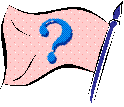 |
 |
CRASH2
has started in Iraq
|
| Diwaniyah Teaching Hospital, established in 1986, is a 452-bed general hospital under the Diwaniyah University College of Medicine. It is the central and only drainage hospital of trauma patients in Diwaniyah province, about 200km south of Baghdad. The average monthly case load is 10,000 patients. The College of Medicine was founded in 1996 and admits on average 45 students per year. Bassim Irheim Mohammad has started randomisation of CRASH2 patients in Diwaniyah and other hospitals in Iraq are in the process of obtaining ethics approvals. | |
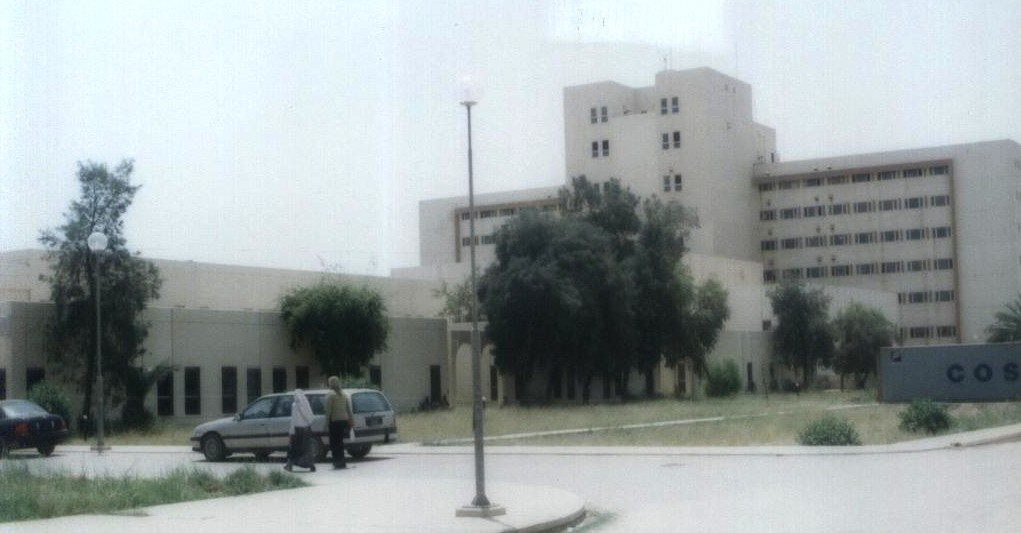 |
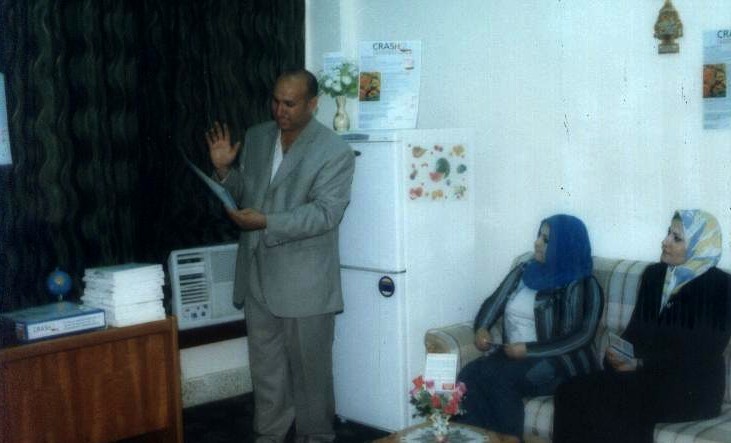 |
| what’s going on in the UK? |  |
| The CRASH2 trial is now up and running in 11 hospitals in the UK, with another 7 awaiting final approvals. We are the first trial to enter incapacitated patients since the introduction of the new consent legislation. Blazing a trail is always hard work, but there is now a much greater understanding amongst NHS R&D Departments of how the legislation can be translated into a practical approach to emergency care research. The CRASH2 trial will answer an important question which could have worldwide application in trauma management. The trial has made an excellent start, but we still need to take every opportunity to randomise patients in order to reach our target. | |
| CRASH2 teams from around the world | |
|
|
All India Institute of Medical Sciences (AIIMS), with Ashok Kumar Mahapatra |
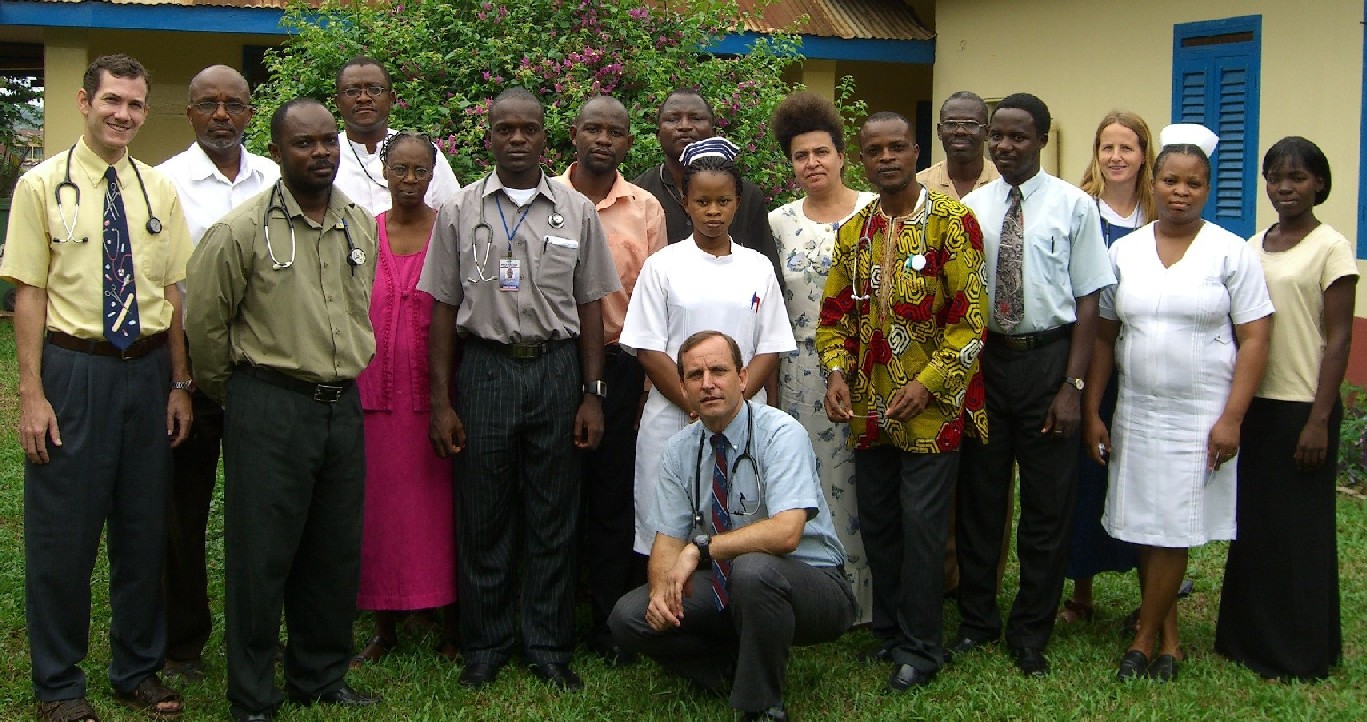 |
Seventh
Day Adventist Hospital, Nigeria, with Herb Giebel
|
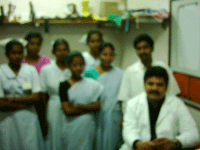 |
Sri
Sakthi Hospital, India with Venkatesh Babu and C Sumathi |
| new randomisers | |
|
THANK YOU TO ALL OF THE FOLLOWING FOR CLEARING THE FIRST HURDLE OF RANDOMISING THEIR FIRST PATIENT – MANY MORE TO FOLLOW: Wilson
Gualteros, Hospital Universitario San Jorge, Colombia |
| new ethics approvals | |
|
CONGRATULATIONS AND WELCOME TO THE FOLLOWING NEW COLLABORATORS: David
Mountain, Sir Charles Gairdner Hospital, Australia |
|
| special mentions | |
|
MANY CONGRATULATIONS FOR THE FOLLOWING OUTSTANDING ACHIEVEMENTS: 250
randomised patients 100
randomised patients 50
randomised patients BEST
DATA QUALITY |